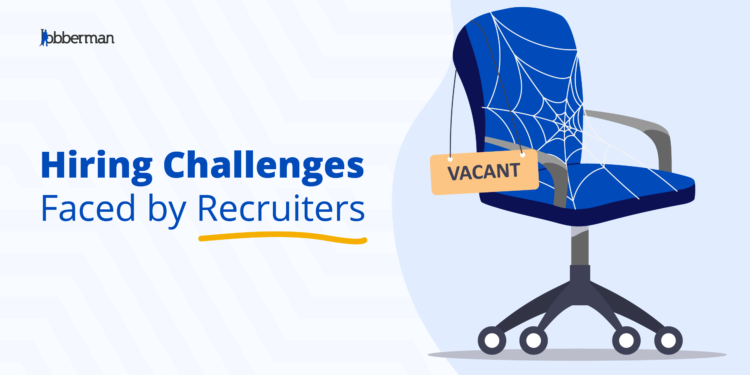As the job market evolves, recruiters face new challenges regarding sourcing, attracting, and retaining top talent. During a large chunk of 2023; the job market will experience a slowdown. Now, recruiters must navigate various challenges, from the rising competition for skilled workers to new technologies changing the recruitment landscape.
A recent peer-led discussion led by Jobberman- HR Breakfast Series produced some insights into talent management. Allowing employees to grow, choosing workplace flexibility, and creating a training budget are some insights that emanated from the discussions.
Recruiting new employees has always been complex and challenging, but today’s job market presents unique and unprecedented difficulties for employers. In this article, we’ll explore the biggest challenges facing recruiters in today’s job market and offer some tips for overcoming them, some of which stemmed from the maiden edition of Jobberman’s HR Breakfast Series.
Here are the top 5 hiring challenges faced you may face as a recruiter or employer in 2023:
Talent shortage
One of the most significant challenges in recruitment today is the talent shortage. The current job market is highly competitive, and skilled workers are in high demand. The unemployment rate is dwindling, and many talented candidates are already employed or actively pursued by other companies. This makes it challenging for recruiters to find the right people for their open positions.
To overcome this challenge, you need to think creatively and be more proactive in your approach to finding candidates. This may involve reaching out to passive candidates who aren’t actively looking for a job but may be open to new opportunities. It may also include expanding the pool of candidates by considering candidates with transferable skills or training candidates on the job. HR experts at Jobberman’s Roundtable Event also agreed that adequate plans should be made to allocate funds for employee training, noting that if employees have to cover expenses, they will more likely leave because of the perceived unwillingness of the organisation to invest in them.
Increasing diversity

Diversity and inclusion are critical considerations for any organisation, but achieving them can be challenging in today’s job market. Many employers struggle to attract diverse candidates and build a diverse workforce, leading to a lack of innovation and poor organisational culture.
To overcome this challenge, recruiters need to think about diversity and inclusion at every stage of the recruitment process. This may involve revising job descriptions to use inclusive language, partnering with organisations that support diversity and inclusion, and offering training to recruiters and hiring managers on how to recognise and address unconscious bias.
According to industry experts at the Roundtable event, a move towards creating more diversity should include adopting initiatives that foster a multigenerational workforce where different generations can learn from each other.
The skills gap
The skills gap is a significant challenge facing many recruiters. With technological advancements and a constantly changing business landscape, the skills needed by employers are continually evolving. However, many job seekers may not have yet had the opportunity to develop these new skills, resulting in a shortage of qualified candidates.
The impact of the skills gap can be significant, with organisations struggling to find the right talent to fill critical roles. This can lead to project delays, increased costs, and a loss of competitiveness.
To address this challenge, organisations may need to invest in upskilling and reskilling their existing workforce and collaborating with educational institutions to ensure that graduates have the necessary skills to meet industry demands.
Companies may also need to adopt new strategies to attract and retain talents, such as offering training and development programs, flexible work arrangements, and competitive salaries and benefits. By proactively addressing the skills gap, organisations can better position themselves for success in an increasingly competitive market.
Evolving candidate expectations
Today’s job candidates have high expectations regarding their job search. They want a streamlined and personalised experience and expect recruiters to be transparent and communicative throughout the recruitment process.
To overcome this challenge, recruiters need to be responsive and communicative throughout the recruitment process. In your hiring process, you should also leverage technology to streamline recruitment and provide candidates with a more personalised experience. This may involve using AI-powered chatbots to answer candidate questions, leveraging social media to engage with candidates, and providing regular updates on the status of their applications.
Demand for flexible work situations

In today’s competitive job market, offering flexible work situations has become a critical factor in attracting and retaining top talent. Companies that fail to provide flexible work arrangements may face challenges in recruiting skilled workers, especially those prioritising work-life balance.
The pandemic further highlighted the attractiveness of remote work, flexible schedules, and other work arrangements that allow employees to balance their personal and professional lives.
Employers who do not offer flexible work situations risk losing talented candidates to competitors who do. Moreover, companies that adapt to changing work trends avoid falling behind and facing talent shortages, which can impact their bottom line.
Experts at the Roundtable Event also cited that competitive talents choose flexibility now more than ever. Preventing them from relocating and exiting would mean adopting less rigid workplace structures.
Shortlisting the best from the stack.

Recruiters often face the daunting task of sorting through a large pool of candidates to identify the best fit for a job opening. With the ease of applying online and the growing popularity of job boards and social media, the number of applications received for each job posting can be overwhelming.
This can be time-consuming and frustrating, as recruiters must review each application to determine which candidates meet the necessary qualifications and possess the desired skills and experience.
Recruitment managers can utilise technology such as the Applicant Tracking System (ATS) and resume screening tools to manage this process efficiently. Another beneficial and simplified service available to recruiters and employers is Jobberman’s Pro Recruit offering. If you were to sign up for this service today, skilled recruiters on Jobberman’s team would find the best talents available, whether they are actively job searching, passive, or already in decent jobs (they can be pretty convincing). They sort through these candidates and provide a list of the 5(five) best-qualified candidates within 5 – 7 business days. This streamlines the hiring process and allows you to focus on conducting interviews to find the best fit.
You are bound to face an array of hiring challenges that demand attention and resourcefulness when looking for top talent. From the fierce competition for talent to the need for faster and more efficient hiring processes. These challenges can make identifying, attracting, and retaining the best candidates difficult.
However, you can start by building a strong employer brand to make your organisation candidate destinations. Becoming adaptable, innovative, and proactive in your hiring strategies can also give you an edge. By staying ahead of the curve and keeping pace with the changing demands of the job market, you can successfully navigate these challenges and attract the best talent for your organisation.
And when all is said and done. Jobberman Nigeria is always on standby to hold your hand and guide you through the most challenging terrains of hiring.
Contact us today.










